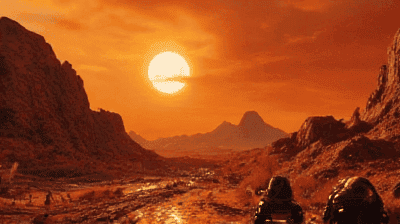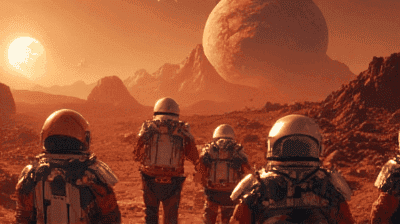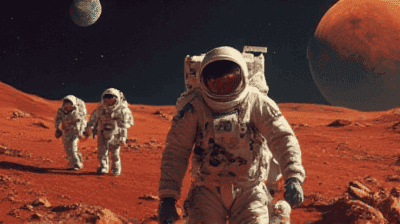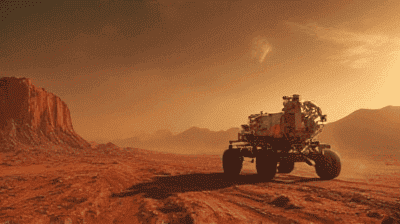Mars Colonization: What Challenges Must We Overcome to Live on the Red Planet?
Mars, the fourth planet from the sun, has long captured the imagination of scientists, explorers, and dreamers alike. With its striking red color and Earth-like features, it tantalizes us with the possibility of colonization. Efforts are underway by national space agencies and private companies to explore Mars and eventually establish a human presence there. However, colonizing the Red Planet comes with formidable challenges, ranging from harsh environmental conditions to technological hurdles.

Introduction
The Significance of Mars Colonization

Before delving into the challenges, it is essential to understand why Mars colonization is considered a vital endeavor:
Scientific Exploration: Mars is one of the best candidates for studying geological processes and possibly searching for past or present life. Understanding Mars can provide insights into the history of our solar system and the potential for life elsewhere.
Survival of Humanity: Establishing a human presence beyond Earth is seen as a way to ensure the long-term survival of humanity. By becoming a multi-planetary species, we reduce the risks associated with potential global catastrophes on Earth.
Technological Advancement: The challenges of colonizing Mars will drive innovation and advancements in technology, potentially benefiting life on Earth in various sectors, including medicine, engineering, and environmental science.
An Overview of Mars
Mars: The Basics
Mars is often referred to as the Red Planet due to its iron oxide-rich soil, which gives it a reddish hue. Here are some key characteristics of Mars that make it a unique planet for colonization:
Size: Mars is about half the diameter of Earth but has a surface area roughly equal to that of all the land on Earth combined.
Atmosphere: Mars has a thin atmosphere composed mostly of carbon dioxide (about 95.3%) with traces of nitrogen and argon. The atmospheric pressure is less than 1% of that on Earth.
Temperature: Temperatures on Mars can vary dramatically, with averages around minus 80 degrees Fahrenheit (minus 62 degrees Celsius). The planet experiences extreme cold, especially at the poles.
Water Presence: While liquid water is not stable on the surface of Mars due to low pressure and temperatures, evidence suggests that water ice is present at the polar ice caps and possibly beneath the surface.
Major Challenges to Mars Colonization

Colonizing Mars requires overcoming significant challenges, including environmental, physiological, technological, and psychological hurdles. Each of these challenges poses its unique set of problems that must be addressed.
1. Harsh Environmental Conditions
One of the foremost challenges to colonizing Mars is the planet's harsh environmental conditions. The following factors make Mars a tough place for human life:
Radiation Exposure: Mars lacks a strong magnetic field and a thick atmosphere, exposing its surface to high levels of cosmic and solar radiation. Long-term exposure can increase the risk of cancer and other health issues.
Low Temperatures: As mentioned earlier, average temperatures on Mars are around minus 80 degrees Fahrenheit. Extreme temperature fluctuations, especially during the Martian night, can drop to minus 195 degrees Fahrenheit (minus 125 degrees Celsius) at the poles.
Dust Storms: Mars is known for its planet-wide dust storms, which can last for weeks and reduce sunlight. Dust storms could hinder solar energy production and impact equipment and habitats.
Low Atmospheric Pressure: The low atmospheric pressure on Mars is inadequate for human respiration and can cause bodily fluids to boil at normal body temperature, a condition known as ebullism.
2. Life Support Systems
Creating a sustainable living environment for humans on Mars requires robust life support systems. The following considerations highlight the complexity of establishing these systems:
Air Supply: As the Martian atmosphere is predominantly carbon dioxide, producing breathable oxygen is necessary. Technologies such as electrolysis, which separates oxygen from water, can be employed.
Water Supply: While water ice exists on Mars, extracting it for human consumption, agriculture, and hydration is challenging. Developing methods to melt ice or extract water from the soil will be crucial.
Food Production: Growing food on Mars poses significant challenges. Factors such as low light levels, reduced gravity, and the need for nutrient delivery must be addressed. Research into hydroponics and aeroponics—growing plants without soil—will be vital for food security.
3. Transportation and Infrastructure
Transporting people and supplies to Mars while establishing the necessary infrastructure poses considerable technical challenges:
Transportation Technology: Developing spacecraft capable of safely transporting humans to Mars and back is crucial. Options being explored include SpaceX's Starship and NASA's Artemis program. The journey to Mars could take around six to nine months with current technology.
Surface Infrastructure: Building habitats, research facilities, and agriculture systems on Mars will require advanced robotics and construction techniques. Martian habitats must be designed to withstand radiation, extreme temperatures, and dust storms.
Energy Generation: Reliable sources of energy will be essential for sustaining a Martian colony. Solar energy, nuclear power, and potentially even local resources, such as Martian regolith, could be harnessed for energy.
4. Health and Physiological Challenges
Living in a reduced gravity environment leads to several health and physiological concerns:
Space Adaptation Syndrome: The transition from Earth’s gravity to Mars’ lower gravity can result in space adaptation syndrome, characterized by disorientation, nausea, and other symptoms.
Bone and Muscle Loss: Prolonged exposure to low gravity can lead to muscle atrophy and bone density loss. Astronauts on the International Space Station engage in exercise regimens to mitigate these effects, which must be adapted for Martian conditions.
Psychological Health: Isolation and confinement in a harsh environment can take a toll on mental health. Maintaining psychological well-being will be critical for the success of a Mars colony, requiring strategies to ensure good communication, social interaction, and recreational activities.
5. Psychological and Social Challenges
The psychological well-being of Martian colonists is paramount. The following factors highlight the challenges of living in a confined, isolated environment:
Isolation: Mars’ distance from Earth means that communication delays can range from several minutes to nearly half an hour. This isolation can lead to feelings of loneliness and detachment.
Team Dynamics: Maintaining effective communication and collaboration among team members is vital to prevent conflict and maintain morale. Training for group dynamics and conflict resolution is essential before embarking on a mission.
Cultural Adaptation: As Mars colonization efforts will involve people from diverse backgrounds, fostering a sense of unity and shared purpose will be necessary to sustain a positive communal atmosphere.
Strategies for Overcoming Challenges
To address the myriad challenges of Mars colonization, research and innovation are crucial, along with strategic planning. The following sections detail potential strategies to overcome these obstacles.
1. Environmental Adaptations
To counteract the harsh conditions on Mars, developing technologies that allow humans to adapt and thrive is essential:
Radiation Shielding: Designing habitats with adequate radiation shielding is vital. Utilizing Martian regolith for construction or incorporating materials with good radiation-blocking properties can provide protection.
Climate Control Systems: Implementing climate control systems within habitats can help regulate temperature and humidity, creating a comfortable living environment.
Resilient Building Materials: The development of materials resistant to extreme conditions, dust, and radiation will contribute to constructing safe and functional habitats.
2. Advanced Life Support Systems
Innovative life support systems will be necessary to create a closed-loop environment:
Oxygen Generation: Employing technologies that can convert carbon dioxide to oxygen will be vital. The MOXIE (Mars Oxygen In-Situ Resource Utilization Experiment) experiment on Mars 2020 is testing this technology.
Water Recycling: Implementing advanced purification and recycling systems will be key to ensuring water availability. Closed-loop systems will minimize water waste and maximize efficiency.
Food Production Systems: Researching and developing resilient agricultural technologies, including hydroponics and closed environment agriculture, can ensure a stable food supply.
3. Transportation and Infrastructure Development
Building a robust transportation system and infrastructure on Mars will be crucial for colonization:
Reusable Launch Systems: Developing reusable spacecraft will reduce the costs of transportation to and from Mars, enabling more frequent missions.
Mars Habitats: Creating modular, expandable habitats that can be rapidly deployed will allow for the establishment of living and working spaces. Robotic systems could assist in building these habitats using local materials.
Resource Utilization: In-situ resource utilization (ISRU) can minimize the need to transport resources from Earth. Technologies to extract water, produce oxygen, and generate energy from Martian resources are essential.
4. Health and Well-being Initiatives
Promoting the health and psychological well-being of Martian colonists will be vital:
Physical Fitness Programs: Developing exercise regimens specific to Martian conditions will help mitigate muscle and bone loss, ensuring the physical health of colonists.
Mental Health Support: Providing access to mental health resources, such as counseling and recreational activities, will foster resilience and morale among colonists.
Community Building: Implementing programs to promote social interaction and a sense of community will be essential for building positive relationships within the colony.
The Role of International Cooperation

Mars colonization is an ambitious undertaking that requires significant collaboration:
Global Expertise: Engaging countries worldwide can pool knowledge, resources, and expertise, fostering innovations that could accelerate colonization efforts.
Shared Goals: Establishing shared goals and ethical standards for Mars exploration can address international concerns and encourage collaborative projects.
Private and Public Partnerships: Collaborations between government space agencies, private companies, and research institutions will play a crucial role in technological advancements and funding.
The Future of Mars Colonization
As technology continues to advance and our understanding of the Red Planet deepens, the prospect of human colonization becomes increasingly plausible. Various organizations are setting ambitious timelines for sending humans to Mars. For instance, SpaceX aims to conduct its first uncrewed missions in the near future, followed potentially by crewed missions within the next decade.
Potential Scenarios for Human Settlement
Initial Outposts: The first stage of colonization may involve establishing small outposts equipped for scientific research, basic life support, and resource extraction.
Expansion of Habitats: As more missions land on Mars, habitats could expand to include agricultural areas, research labs, and recreation spaces, creating a semi-autonomous colony.
Cultural Development: Over time, as more people inhabit Mars, a unique Martian culture may emerge, shaped by the challenges and experiences of living on another planet.
Conclusion
The dream of colonizing Mars presents exciting possibilities as well as daunting challenges. While the difficulties ahead are formidable, ongoing research and technological advancements provide hope for a future where humanity thrives on the Red Planet. By addressing environmental, physiological, and psychological hurdles, we can lay the groundwork for a sustainable human presence on Mars, expanding our understanding of the universe and ensuring the long-term survival of our species. The journey toward Mars colonization will not only encompass scientific exploration but also the resilience, ingenuity, and spirit of cooperation that define humanity’s quest to become a multi-planetary species.
